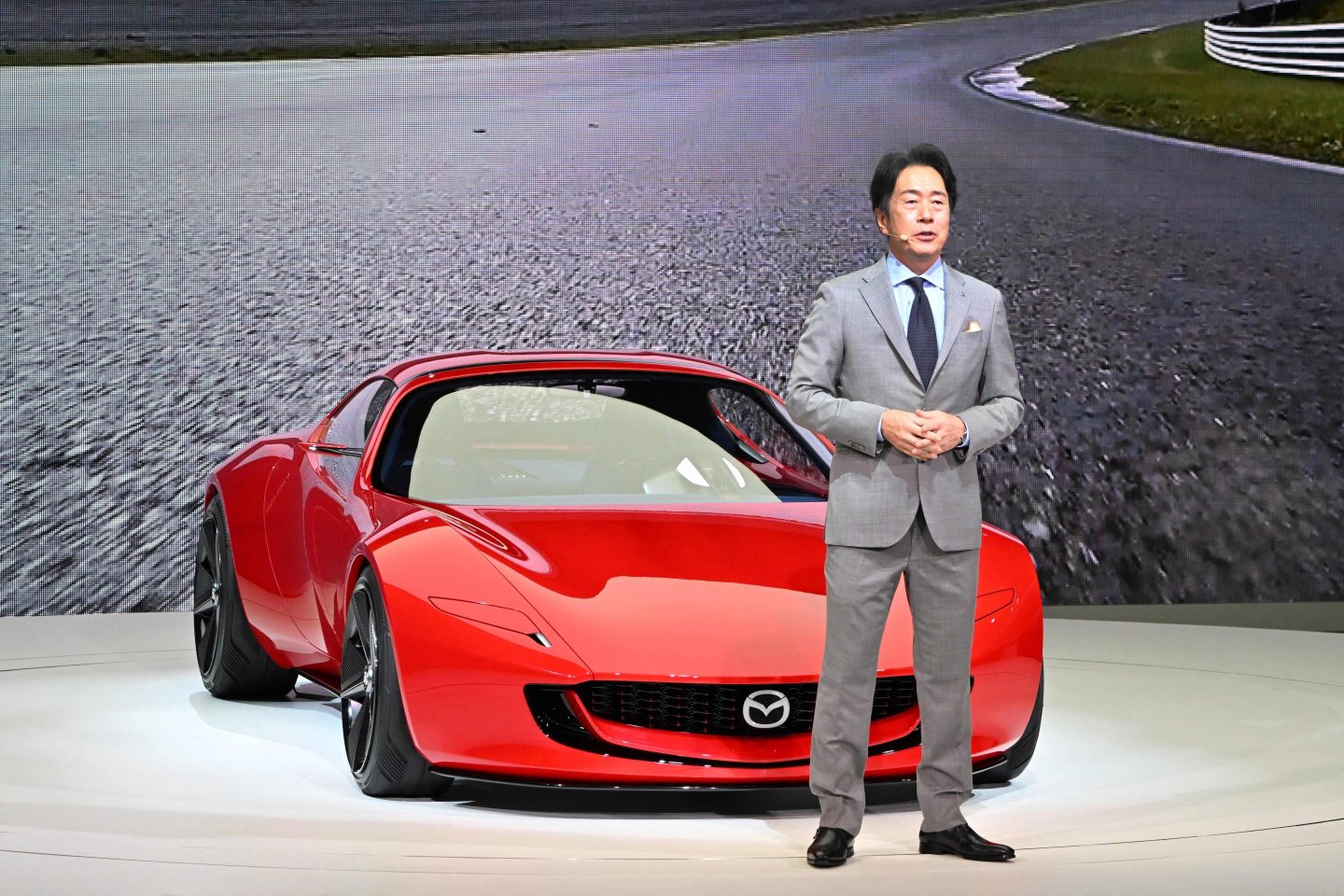Good morning.
The age of electric vehicles is coming, but it is not coming nearly as fast as expected a couple of years ago. I spoke last week with two CEOs who are in the middle of the transition: Chrissy Taylor, CEO of Enterprise Mobility in St. Louis, and Masahiro Moro, CEO of Mazda in Hiroshima, Japan. Both cited lack of charging stations as a major reason. Taylor, who drives an electric car, said this:
“Quite honestly, the demand has always been low. It’s just slow. It’s not where it needs to be. The demand is low because the infrastructure is low.”
Moro echoed Taylor’s comments.
“EV is absolutely important technology, and we are developing it. But [in the U.S.] EVs last year [were] about 6% of the market. This year it is 8%. And out of that 8%, 57% was Tesla. Other EVs are not taking off, inventory is piling up.”
Egged on by the success of Tesla and facing pressure to act on climate change, big auto makers like GM and Ford set ambitious targets for their electric vehicles. Two years ago, General Motors CEO Mary Barra said GM would only produce emissions-free vehicles by 2035. But smaller players, like Mazda and Enterprise, are taking their cues from the market. And the market isn’t on track for hitting zero in 2035. Said Taylor:
“For us, it is an evolution, and the customer has to drive it. We have not put a goal on it. We will move as fast as the customer. We never want to surprise them with new technology.”
Moro said much the same:
“How we get to zero is up to consumer choice and social infrastructure.”
That balance between driving the energy transition forward, and meeting consumer demand will be a hot topic this week at both the Fortune Global Forum in Abu Dhabi, which begins today, and the COP 28 confab in nearby Dubai, which begins Thursday. The setting is symbolic: the Abu Dhabi National Oil Company is a major global oil and gas producer, yet Abu Dhabi is also making huge investments in alternative energy to ensure its place in a post-oil economy—whenever it comes. Accelerating the energy transition is one of the goals of this year’s COP meeting, but companies can only move as fast as consumers allow them.
By the way, I spent Sunday evening watching Max Verstappen win his 19th F1 race of the season at the Abu Dhabi Grand Prix. Hard to imagine when this speed-, sound-, and adrenaline-filled spectacle will switch to electric.
I’ll be reporting more from here all week. Other news below.

Alan Murray
@alansmurray
alan.murray@fortune.com
TOP NEWS
Elon's damage control
X owner Elon Musk will meet with Israeli Prime Minister Benjamin Netanyahu and representatives of Israeli hostages held in Gaza in an apparent attempt to quiet uproar over Musk's X post supporting an antisemitic trope. Musk has denied being antisemitic and defended his behavior, but advertisers have fled X in droves amid the controversy. Bloomberg
Black Friday bump
Online spending this Black Friday jumped 7.5% from a year ago, according to Adobe Analytics. The surge indicates price-conscious Americans are still hunting for bargains but are looser with their pocketbooks than in 2022, when gas and food prices were extraordinarily high. CNBC
Unhappy workers
American workers are more unhappy than they've been in years, with employee satisfaction equalling early 2020 levels, despite pay increases and improved flexibility. There are many reasons for worker discontent, but top gripes include inflation eroding wage gains and employers micromanaging the return to the office. Wall Street Journal
AROUND THE WATERCOOLER
Return-to-office mandates go over better with Gen Zers and boomers than with millennials. Here’s why by Steve Mollman
Commentary: Beware of crypto grifters looking to crash the AI party by Kathleen Breitman
Wealthy six-figure earners who kept the economy chugging along are starting to pinch pennies, signaling the post-COVID spending boom may be over by Alicia Adamczyk
The motherhood penalty laid bare: From co-workers comparing pregnant colleagues to broken race cars, to senior women ‘hazing’ other moms by Orianna Rosa Royle
AI should make the 4-day work week possible for millions of workers. The question is whether they’ll use the free time for leisure—or more work by Prarthana Prakash
How Edible Arrangements is ditching its ‘granny’ brand as it tracks to hit $500 million in sales this year by Ruth Umoh
Japan’s new tallest skyscraper is also fat—sprawling enough to fit the mixed-use demands of post-COVID city life by Nicholas Gordon
This edition of CEO Daily was curated by Claire Zillman.
This is the web version of CEO Daily, a newsletter of must-read insights from Fortune CEO Alan Murray. Sign up to get it delivered free to your inbox.














